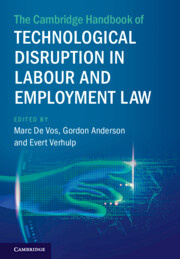Zařazeno v kategoriích: ZAHRANIČNÍ LITERATURA
Cambridge Handbook of Technological Disruption in Labour and Employment Law
Vos de Marc, Anderson Gordon, Verhulp Evert
Formát
260x180
ISBN
978-1-108-84005-7
EAN
9781108840057
Whether through gig work, remote work, or platforms such as Uber, new technologies are reshaping the very fabric of employment relations. This handbook offers a comprehensive, international overview of how institutions, countries, and legal systems are responding to the technological disruption of the work world. Chapters outline the reform agendas driven by the International Labour Organization and the European Union and detail the public policy debates, litigation, and legal reforms that technological innovation has triggered around the world. This volume provides a post-pandemic assessment of how digitalization is affecting employment and employment relations and contextualizes current technological disruption with a long-term view of how labour and employment law could evolve further.
Ostatní s tímto titulem kupují:
-
Položka byla přidána do košíku.
















